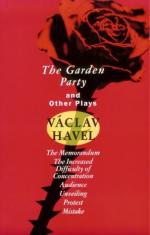|
This section contains 5,843 words (approx. 20 pages at 300 words per page) |

|
SOURCE: "Interpreting Václav Havel," in Cross Currents, Vol. 47, No. 3, Fall, 1997, pp. 301-16.
In the following essay, Capps examines Havel's artistic and philosophical development in the context of Czechoslovakian intellectual tradition and contemporary politics.
Though the intellectual and academic worlds haven't caught full sight of it yet, we are standing on the threshold of a new era in thought, idea, and cultural construction. This new era has been made possible by the ending of a prolonged Cold War, and the sudden, unexpected opportunity to learn how the people of Eastern bloc nations sustained themselves culturally and spiritually during the time of their subjection to totalitarian forces. For most of the Cold War period, philosophical and artistic expression in Marxist countries was neither widely known nor acknowledged in the western world. Since the appropriate evidence was not readily available, it was too easy to assume that not much of...
|
This section contains 5,843 words (approx. 20 pages at 300 words per page) |

|


